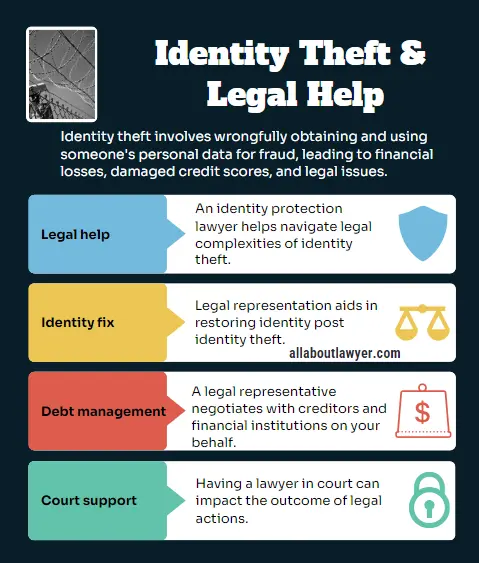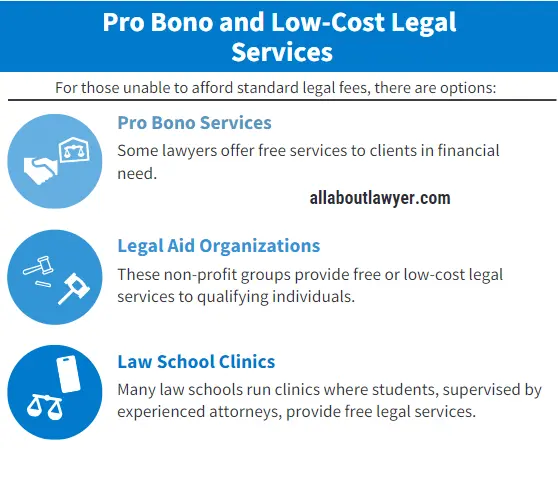Identity Theft Lawyer Cost Fees, Factors, and Financial Considerations
In an increasingly digital world, the threat of identity theft looms large over individuals and businesses alike. When faced with the devastating consequences of having one’s identity stolen, many turn to legal professionals for help. However, a common concern that arises is the identity theft lawyer cost. This comprehensive guide will explore the various aspects of identity fraud attorney fees, helping you understand what to expect when seeking legal representation for identity theft cases.
Table of Contents
Understanding Identity Theft and the Need for Legal Representation
Before delving into the costs, it’s crucial to understand what identity theft entails and why legal representation might be necessary. Identity theft occurs when someone wrongfully obtains and uses another person’s personal data for fraud or deception, typically for economic gain. The consequences can be severe, ranging from financial losses to damaged credit scores and even legal troubles.
An identity protection lawyer can provide invaluable assistance in navigating the complex legal landscape surrounding identity theft. They can help with:
1. Restoring your identity
2. Dealing with creditors and financial institutions
3. Representing you in court if necessary
4. Seeking compensation for damages incurred

Factors Influencing Identity Theft Lawyer Costs
Several factors can influence the personal data theft legal expenses you might incur:
1. Complexity of the Case:
More complex cases involving multiple instances of fraud or large financial losses typically require more time and resources, potentially increasing costs.
2. Lawyer’s Experience:
Highly experienced cybercrime defense counsel often charge higher rates, but their expertise can be invaluable in complex cases.
3. Geographic Location:
Legal fees can vary significantly based on the cost of living and competitive landscape in different regions.
4. Type of Legal Services Required:
The scope of services needed, from simple consultations to full-scale litigation, will impact the overall cost.
5. Fee Structure:
Lawyers may use different fee structures, which can affect the total cost of representation.
Common Fee Structures for Identity Theft Cases Lawyer
Identity theft legal representation costs can be structured in several ways:
1. Hourly Rates: Lawyers charge for their time, with rates typically ranging from $150 to $500 per hour, depending on experience and location.
2. Flat Fees: For certain services, such as writing cease and desist letters or filing specific motions, attorneys may charge a set fee.
3. Contingency Fees: In cases where financial recovery is possible, some lawyers may work on a contingency basis, taking a percentage of the amount recovered.
4. Retainer Agreements: Clients pay an upfront fee, from which the attorney’s hourly or flat fees are deducted as work is performed.
Average Costs for Identity Theft Legal Services
While costs can vary widely, here are some general ranges for common identity theft legal services:
1. Initial Consultation:
Many lawyers offer free initial consultations, while others may charge $100-$300 for this service.
2. Basic Services:
For straightforward cases involving credit report corrections or correspondence with creditors, costs might range from $500 to $2,000.
3. Comprehensive Representation:
For more complex cases involving litigation, costs can range from $5,000 to $50,000 or more, depending on the case’s complexity and duration.
Hidden Costs to Consider
When budgeting for identity theft legal representation, be aware of potential additional costs:
1. Court Filing Fees: These vary by jurisdiction but can range from $100 to $500 or more.
2. Expert Witness Fees: If needed, these can range from $1,000 to $10,000 or more.
3. Document Preparation Costs: Fees for obtaining and preparing necessary documents.
4. Travel Expenses: If the attorney needs to travel for your case.
Cost-Benefit Analysis of Hiring an Identity Theft Lawyer
When considering the financial identity theft legal fees, it’s crucial to perform a cost-benefit analysis:
1. Potential Recovery Amount: Assess the potential financial recovery against the cost of legal services.
2. Time and Stress Savings: Consider the value of having a professional handle the complex process.
3. Long-term Protection: Weigh the cost against the long-term benefits of resolving the identity theft issue comprehensively.
Alternatives to Full Legal Representation
In some cases, alternatives to full legal representation may be more cost-effective:
1. Legal Clinics: Some organizations offer free or low-cost legal advice for identity theft victims.
2. Identity Theft Recovery Services: Many credit monitoring services include recovery assistance as part of their packages.
3. Government Resources: The Federal Trade Commission provides free resources and guidance for identity theft victims.
Realted Articles For You:
Should I Hire a Lawyer for Identity Theft?
Texas Identity Theft Enforcement and Protection Act
Negotiating Fees with Identity Theft Lawyers
When engaging an identity theft victim advocacy professional, don’t hesitate to discuss fees and potentially negotiate:
1. Ask for a Clear Fee Structure: Ensure you understand exactly how and when you’ll be charged.
2. Discuss Payment Plans: Some attorneys may offer payment plans to make their services more accessible.
3. Explore Limited Scope Representation: You might be able to hire the lawyer for specific tasks rather than full representation.
The Role of Insurance in Covering Legal Costs
Some insurance policies may help cover identity theft legal expenses:
1. Homeowners or Renters Insurance: Some policies include identity theft coverage.
2. Specialized Identity Theft Insurance: These policies often cover legal fees related to identity theft.
3. Cyber Insurance: For businesses, this type of insurance may cover identity theft-related legal expenses.
Pro Bono and Low-Cost Legal Services
For those unable to afford standard legal fees, there are options:
1. Pro Bono Services: Some lawyers offer free services to clients in financial need.
2. Legal Aid Organizations: These non-profit groups provide free or low-cost legal services to qualifying individuals.
3. Law School Clinics: Many law schools run clinics where students, supervised by experienced attorneys, provide free legal services.

The Impact of Case Complexity on Legal Costs
The complexity of an identity theft case can significantly influence the overall legal expenses:
1. Simple Cases: Straightforward cases of credit card fraud or unauthorized accounts may be resolved relatively quickly and inexpensively.
2. Complex Fraud Schemes: Cases involving elaborate fraud schemes or identity theft rings may require extensive investigation and litigation, increasing costs.
3. Business Identity Theft: When a business’s identity is stolen, the legal process can be more complex and costly due to the potential for larger financial losses and more intricate financial structures.
Long-term Cost Considerations
When evaluating identity theft recovery legal assistance fees, consider the long-term financial implications:
1. Credit Restoration: The cost of legal help in restoring your credit can pay off in future savings on loans and credit.
2. Preventing Future Theft: Legal assistance in setting up robust identity protection measures can prevent future costly incidents.
3. Peace of Mind: While hard to quantify, the peace of mind that comes with professional legal handling of your case has value.
Conclusion
The identity theft lawyer cost can vary widely based on numerous factors, including the complexity of the case, the lawyer’s experience, and the fee structure used. While legal representation can be a significant investment, it should be weighed against the potential for financial recovery, time and stress savings, and long-term protection against future identity theft issues.
When faced with identity theft, it’s crucial to:
1. Assess the full extent of the identity theft and potential damages
2. Explore all available options, including insurance coverage and low-cost legal services
3. Clearly understand fee structures and potential additional costs
4. Consider the long-term benefits of professional legal assistance
By carefully considering these factors, victims of identity theft can make informed decisions about seeking legal representation, balancing the costs against the potential benefits of professional legal assistance in resolving their identity theft issues.
FAQs
Q: How much does an initial consultation with an identity theft lawyer typically cost?
A: Many identity theft lawyers offer free initial consultations. For those who do charge, the cost typically ranges from $100 to $300 for a 30-60 minute consultation.
Q: Can I recover legal fees as part of an identity theft lawsuit?
A: In some cases, yes. If your case goes to court and you win, the judge may order the defendant to pay your legal fees. However, this is not guaranteed and depends on the specific circumstances of your case.
Q: Are there any free legal resources for identity theft victims?
A: Yes, there are several free resources available. The Federal Trade Commission offers guidance and resources for identity theft victims. Additionally, some non-profit organizations and legal aid societies provide free or low-cost assistance to qualifying individuals.
Q: How long does an identity theft case typically take to resolve?
A: The duration can vary widely depending on the complexity of the case. Simple cases might be resolved in a few months, while more complex cases involving litigation can take a year or more.
Q: Is it worth hiring a lawyer for a small identity theft case?
A: It depends on the specifics of your case. For minor instances with limited financial impact, you might be able to resolve the issue yourself using free resources. However, even for smaller cases, a lawyer’s expertise can be valuable in ensuring all aspects of the theft are addressed and your rights are fully protected.
About the Author

Sarah Klein, JD, is a former consumer rights attorney who spent years helping clients with issues like unfair billing, product disputes, and debt collection practices. At All About Lawyer, she simplifies consumer protection laws so readers can defend their rights and resolve problems with confidence.
Read more about Sarah
